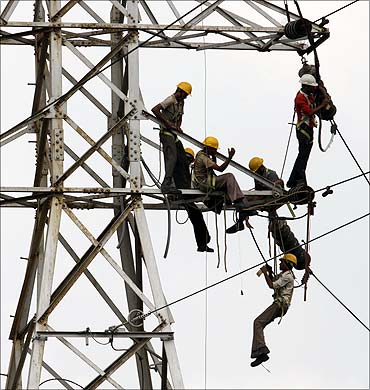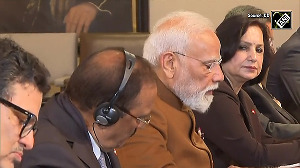 Power transmission infrastructure in the country's 18 major cities could be potentially hacked leading to national security threats and major disruption of power if the concerns of a prominent trade body are to be believed.
Power transmission infrastructure in the country's 18 major cities could be potentially hacked leading to national security threats and major disruption of power if the concerns of a prominent trade body are to be believed.
Indian Electronics and Electricals Manufacturers' Association (IEEMA), the representative body of power equipment makers, has asked for a complete ban on Chinese equipment in the Indian power sector citing security concerns in a letter to National Security Advisor Ajit Doval.
"Awarding projects related to power generation, transmission and distribution network to Chinese companies will be a serious threat to national security as the electric distribution system carry power to pipelines, water systems, telecommunications and other critical infrastructure, while also serving critical government or military facilities," said the letter by IEEMA to the national security advisor, reviewed by Business Standard.
These cities are spread across Rajasthan, Madhya Pradesh and Tamil Nadu and they are currently implementing smart grid projects. They could be exposing themselves to the threat of monitoring systems deployed by foreign firms, it is being feared.
IEEMA alleged that over the past few years China has mounted repeated attacks on Indian computer networks and, therefore, information flowing in the Indian grid is more vulnerable to hacking than ever.
Recently, the Philippines government prevented Chinese technicians from taking part in the country's electricity transmission projects because national security concerns.
To make the power distribution network efficient, state grids have installed Supervisory Control and Data Acquisition System (SCADA), which is an industrial control system to monitor and control industrial processes, mostly through remote technology.
As many as 18 cities in India have awarded the contract to deploy SCADA to Chinese firms.
"The need of the hour is not to protect the Indian industry but to intelligently safeguard our business and economy from a neighbour whose intentions are suspicious, and where pricing and business are not rational nor driven by the market," the letter said.
However, restricting such deployments may be easier said than done. "Trade bodies are free to present their case, but if you look at the larger dimension, India is a signatory to international trade and tariff agreements, under which you can't put any country at a disadvantageous position," said a senior government official with a security agency. The official said though China often finds itself at the centre of such controversies, the allegations may be difficult to prove. Statistics show attacks are coming from China and also from other nations such as the US; so, the actual point of origin can't be zeroed in on, said the official.
According to IEEMA's database, during the last eight years, 2005-06 to 2013-14, India's import of electrical equipment has increased at a compound annual growth rate (CAGR) of 19.73 per cent in rupee terms and was at Rs 58,354 crore (Rs 583. 54 billion) in 2013-14.
Of this, imports from China touched Rs 22,680 crore (Rs 226.80 billion) in 2013-14, growing at a CAGR of 34.57 per cent in the last eight years.
"Given the fact that India can't manufacture its own equipment in large volumes, the ideal way to deal with the situation is to be vigilant and create a ring of security around a project. If the government deploys multiple vendors at different levels of a project, it makes a system less vulnerable," said the official.
 To this suggestion, IEEMA executives said wherever there are technological gaps, foreign parties should be asked to set up their manufacturing bases in India. "In critical sectors like power, where we have probable threats, technology transfer should also be made mandatory," said a senior IEEMA executive.
To this suggestion, IEEMA executives said wherever there are technological gaps, foreign parties should be asked to set up their manufacturing bases in India. "In critical sectors like power, where we have probable threats, technology transfer should also be made mandatory," said a senior IEEMA executive.
A policy in the telecom sector to give preference to domestically manufactured equipment and restrict Chinese-made goods faltered at the very start.
A few years ago, preferential market access policy for telecom equipment - a sector which is also dominated by Chinese imports - was introduced that reserved almost one-third of procurement by the government, as well as private companies, for domestically manufactured goods.
However, strong opposition and alleged violation of World Trade Organisation rules forced the government to put the policy in abeyance. The policy is now only valid for government procurement for a handful of items such as desktops and printers, among others.










